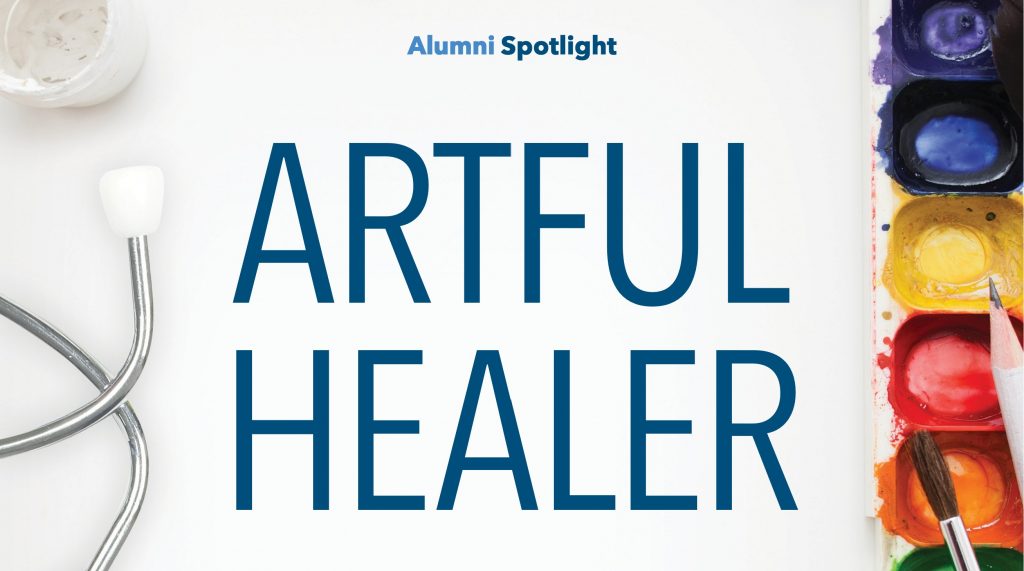Emma Astrike-Davis, M.D., ’14, was in sixth grade when she helped her great-grandmother move into a nursing home after a prolonged hospital stay. She saw how deeply the loss of independent living impacted her great-grandmother, and she made the effort to visit frequently and bring artwork and furnishings to help alleviate that loss. When she told her great-grandmother that she wished that everyone living in the nursing home could have their own artwork, her great-grandmother gave her encouragement: you can make that happen.
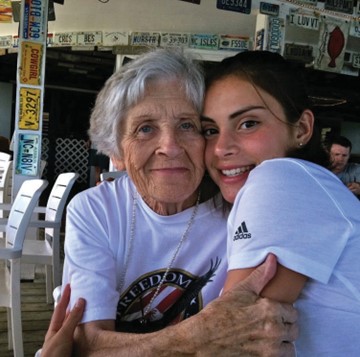
“My great-grandmother was very much that kind of person. She survived many challenges in her life, and she firmly believed that if you want change to happen, you should be the one to do it,” says Astrike-Davis with a smile. It is a message that she has taken to heart as a guiding life principle—one which has led to a promising career as a physician committed to improving equity in healthcare and as founder and president of a growing international nonprofit, Art for Hospice.
In both roles, Astrike-Davis’s passion—for forging authentic connections with her patients and easing the human condition through the exercise of empathy, kindness, and compassion—is evident.
“When I graduated medical school, my mentor, Dr. Pouru Bhiwandi gave me a paraphrased quote from Hippocrates to guide my practice: ‘We cure sometimes; we treat often, but we can always provide comfort,’” shares Astrike-Davis. “We don’t always get wins in medicine; we often face tough situations where there are no ideal solutions. But when you can navigate difficult decisions alongside patients and their families, when you can bring clarity to chaotic situations or significant life changes, when you feel like you are able to truly help a patient and their loved ones—that is an immeasurable reward.”
Currently beginning her second year of internal medicine residency at the University of North Carolina, Astrike-Davis intends to subspecialize in rheumatology, a decision inspired, fittingly, by her own family.
“My first exposure to rheumatology was attending a doctor’s appointment with my grandmother,” shares Astrike-Davis. “She was diagnosed with rheumatoid arthritis (RA) at a time when treatment options were more limited. The development of biological therapies eventually brought my grandmother relief towards the end of her life and impressed upon me the necessity of ongoing medical research.” “I was also inspired by the relationship my grandmother had with her rheumatologist. RA can be a debilitating disease, but she was committed to helping my grandmother remain able to enjoy all the things that were important to her, like her yoga class, volunteer work, or simply being with her grandchildren. I remember being touched by how well she knew my grandma and her commitment to helping her enjoy her life. That is the kind of relationship that I want to have with my patients.”
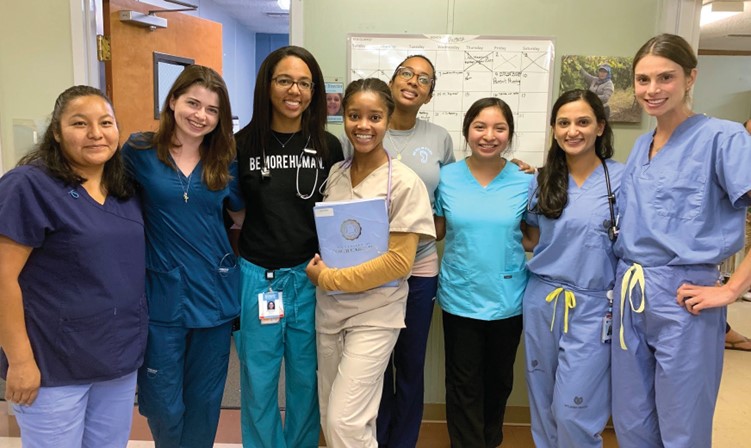
BEYOND THE CLINIC
Interested in medicine from a young age, Astrike-Davis credits Cary Academy with giving her the time and space to explore her nascent interest. During her junior-year Discovery Term, she shadowed a doctor in infectious diseases at a children’s hospital in Florida.
“I went to his lab, his lectures, and then to his clinic and rounds at the hospital. The breadth of what he did—translating research to practice— was fascinating,” reflects Astrike-Davis. “It spoke directly to interests that Mr. Rushin had fostered in my AP chemistry classes—about how to understand the world starting at a molecular level.”
Astrike-Davis was particularly inspired by the doctor’s efforts outside the clinic, which sought to bring vaccines to marginalized children and adults who might not otherwise have access. Intrigued by “seeing practitioners take medicine outside of clinic walls,” Astrike-Davis would go on to be a Morehead-Cain Scholar at the University of North Carolina at Chapel Hill where she majored in public health and nutritional biochemistry before attending medical school.
A series of volunteer opportunities and fellowships brought valuable firsthand experience with the disparities and inequities within American healthcare systems, solidifying Astrike-Davis’s passion for expanding access to healthcare for underserved populations.
As an MSTAR Fellow at the American Federation for Aging Research and President of the UNC American Geriatrics Society, she sought to bolster support and research opportunities for aging populations who are often excluded from medical trials, despite representing primary targets for treatments.
“If your only interaction with elderly populations is in the clinic and the hospital, you get a very narrow window of understanding. To me, an important part of our job in medicine is to understand who our patients are in the community and what their goals are for the future.”
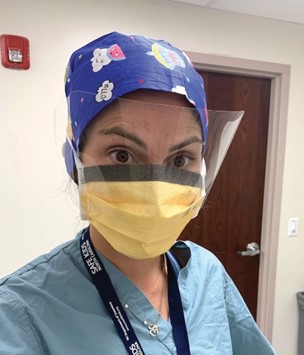
As co-President of the Farm Worker Student Health Alliance and Schweitzer Fellow, Astrike- Davis worked to educate med students about health issues facing migrant workers and sought to expand migrant farmworker access to insurance and healthcare. Traveling to migrant farmworker camps in Benson, North Carolina, she spent evenings going person-to-person enrolling workers in low- cost health insurance. During the day and in after- hours clinics, she provided Spanish interpretation services at health clinics, helping to bridge a language barrier between providers and patients to help ensure equitable care for migrant workers.
Making a Difference
For many, tackling some of the most intractable issues in healthcare might be daunting, but for the perpetually curious Astrike-Davis, it is motivating.
“The more I learn in my career in medicine, the more I want to know. There are many conditions that lack understanding and treatment. Beyond that, there are many communities that lack access to healthcare to receive treatment. These are the challenges that we all face, and the challenges that I look forward to tackling for the rest of my career.”
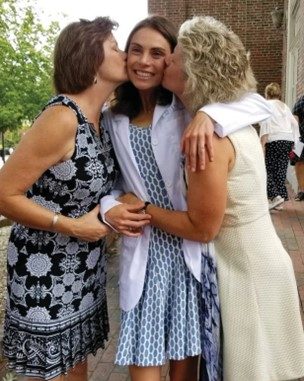
Astrike-Davis credits her parents— Nancy Astrike, who serves on the CA PTAA Diversity Committee, and Joan Davis, who currently serves on Cary Academy’s Board of Directors—for instilling in her the resiliency to follow her inner voice to do difficult work and a call to serve her community.
“My parents are trailblazers in lots of wonderful ways—one small way is that they are two women. When I started at Cary Academy, I did not know any other students with gay parents. Now, I’m pleased to know there are many students at CA with nontraditional families; I love how far we’ve come as a community in just 10 years!”
“When my parents chose to start our family, it was not the easy choice to make. By making that choice, and taking pride in me, Evan and the family that we create—they taught us the value of remaining true to yourself despite challenges. They taught us to find supportive communities and continue to build them.”
ART FOR HOSPICE
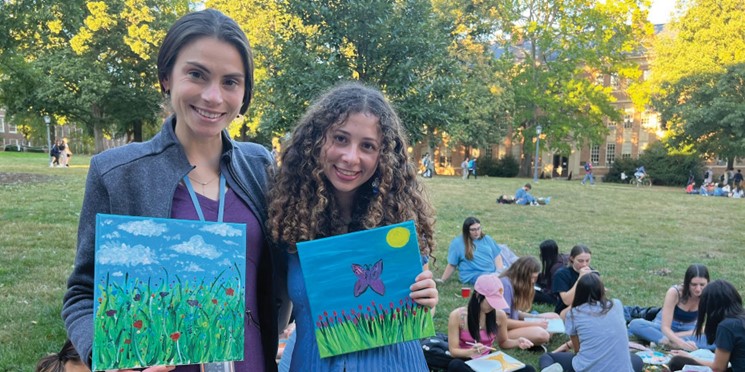
Founded by Astrike-Davis when she was only 12 years old (and in direct response to her great-grandmother’s challenge), Art for Hospice aims to share student art with individuals residing in local nursing homes, hospitals, and hospices.
As president, Astrike-Davis raises funds to purchase blank canvases and supplies, cultivates partnerships with schools and museums, and facilitates their relationships with local healthcare facilities in their respective areas. To date, Art for Hospice has distributed over 6,000 pieces of student art to participating organizations across the globe and received both national and local recognition for its impact.
Last year, Astrike-Davis partnered with her brother, current CA student, Evan Astrike-Davis, ‘24, and CA’s Upper School Art Club on a student-led fundraiser at Cary Academy, which raised over $500 to support Art for Hospice.
“The funds that CA students raised are critical to allowing Art for Hospice to partner with other schools that don’t have the same resources. It allows us to expand the program to further communities that might not otherwise be able to participate,” says Astrike-Davis.
ART FOR HOSPICE

